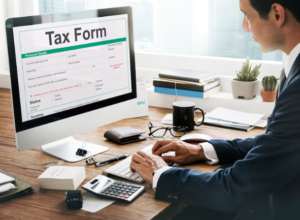As a business owner, understanding the basics of business taxation is crucial to ensuring your financial success and avoiding any potential legal trouble.
There are several types of levys that business owners must pay, each with its own set of rules and regulations.
Income levy is one of the most important levy for businesses to understand. As a business owner, you will need to pay income levy on any profits your business earns.
Self-employment levy and payroll levy are also important levys to be aware of, as they both impact your employees and your business’s bottom line.
Additionally, sales and excise tax can be a major expense for businesses that sell goods or services.
By understanding the basics of each of these Levys, you can make informed decisions about your business finances and ensure that you stay compliant with all applicable laws and regulations.

Types of Taxes for Business Owners
You’ll learn about different Levys you’ll need to pay as a business owner, including income levy, sales levy, and payroll levy.
Income Levy is based on the net income of the business. As a business owner, you’re responsible for reporting all of your business income and expenses on your levy return, and paying the appropriate amount of income Levy. However, there are levy deductions and Levy credits available that can help reduce the amount of income levy you owe.
Sales levy is another levy that business owners need to be aware of. This Levy is collected by the state and local governments on the sale of goods and services. As a business owner, you’re responsible for collecting and remitting sales tax to the appropriate government agencies.
Finally, payroll levy is a levy that is paid on the wages and salaries of employees. As a business owner, you’re responsible for withholding the appropriate amount of payroll tax from employee paychecks, and paying the employer portion of payroll levy.
Income Tax for Businesses
The section on income levy for enterprises delves into the intricacies of levy laws and their implications on businesses. As a business owner, you need to understand how income tax works and how it affects your business.
Income levy is a levy on the profit that your business earns, and it is paid to the government annually. When it comes to income levy, there are tax deductions and levy credits that you can take advantage of to lower your levy bill.
Levy deductions are expenses that you can subtract from your taxable income, while levy credits are dollar-for-dollar reductions in the amount of levy you owe. It is important to keep track of all your business expenses and maintain accurate records to maximize your levy deductions and credits.
Understanding income tax and utilizing tax deductions and credits can help your business save money and remain financially stable.
Self-Employment Tax and Payroll Tax
Oh, so you thought you were done with taxes after figuring out income tax for your business? Ha! Get ready for the next level of fun with self-employment tax and payroll tax. Don’t worry, it’s a blast (said no one ever).
Self-employment tax is a tax that must be paid by all self-employed individuals. It’s basically the equivalent of Social Security and Medicare taxes that are withheld from an employee’s paycheck. As a self-employed individual, you’re responsible for paying both the employee and employer portions of these taxes.
Calculating deductions and filing quarterly payments can be a bit confusing, but it’s important to stay on top of this tax to avoid penalties.
Payroll tax, on the other hand, is a tax that employers must pay on behalf of their employees. This tax includes Social Security, Medicare, and federal income tax withholding. As an employer, you’re responsible for withholding the appropriate amount of taxes from your employees’ paychecks and submitting those payments to the government.
Staying organized and keeping accurate records is crucial when it comes to payroll tax.
Sales and Excise Tax
Ready to tackle sales and excise Levys? It’s time to dive into the nitty-gritty of what you need to know as a business owner.
Sales levy is a levy levied on the sale of goods and services, while excise levy is a levy on specific goods such as alcohol, tobacco, and gasoline. Both taxes are typically collected by the state government and can vary depending on the state and the type of product being sold.
As a business owner, it’s crucial to understand which transactions are taxable and which are exempt. For example, some states exempt certain types of clothing or food products from sales levy. Additionally, if you sell products online, you may be required to collect sales levy in states where you have a significant presence, known as a nexus.
Understanding the ins and outs of sales and excise levy can be complex, but it’s important to ensure that you are complying with state regulations to avoid costly penalties and fines.
Staying Compliant and Avoiding Penalties
To avoid costly penalties and fines, it’s crucial for business owners to stay compliant with state regulations regarding sales and excise Levys. One way to ensure compliance is to keep track of levy filing deadlines. Failing to file Levys on time can result in hefty penalties, which can significantly impact your business’s bottom line.
To avoid such penalties, set reminders and keep a calendar of all levy filing deadlines. It’s also important to keep accurate records of all sales and excise levy transactions. This includes keeping track of sales receipts, invoices, and other relevant documents. In addition to levy filing deadlines, business owners must also meet record-keeping requirements.
These requirements vary by state but generally involve keeping records of sales and purchases, including receipts, invoices, and other documentation. Accurate record-keeping is essential for staying compliant with state regulations and for providing proof of transactions during an audit.
Business owners should also keep records of any exemptions or credits they claim on their levy returns. By staying compliant with state regulations and meeting record-keeping requirements, business owners can avoid costly penalties and fines and ensure the long-term success of their business.
How do they manage Business to stay on top of everything? The answer lies in the technology they use. link
Frequently Asked Questions
What are the deductions that businesses can claim against their taxable income?
Are you wondering what deductions your business can claim against its taxable income? Well, you’re in luck!
Capital expenses and depreciation methods are two key areas where businesses can reduce their taxable income. Capital expenses are costs incurred to acquire or improve a long-term asset, such as a building or equipment. These expenses can be deducted over time through depreciation methods, which allow businesses to spread out the cost of the asset over its useful life.
There are several depreciation methods available, including straight-line, accelerated, and bonus depreciation. By taking advantage of these deductions, businesses can lower their taxable income and keep more money in their pockets.
As the saying goes, “a penny saved is a penny earned.”
How do businesses calculate their estimated tax payments throughout the year?
To ensure that your business is paying the correct amount of Levys throughout the year, you’ll need to make quarterly filings of estimated levy payments. This involves calculating your business’s income and expenses for the current quarter and using that information to estimate your total levy liability for the year.
To make this process easier, you can use levy software designed specifically for businesses, which can automate many of the calculations and help you stay on top of your estimated levy payments to avoid penalties and interest charges.
By staying up-to-date with your estimated levy payments, you can avoid surprises come levy season and keep your business running smoothly.
What are the tax implications of hiring independent contractors versus employees?
Are you still confused about employee classification and levy liabilities? Well, let me tell you, it can be a real headache when you don’t get it right!
The levy implications of hiring independent contractors versus employees can be significant. If you misclassify an employee as an independent contractor, you could be liable for back Levys, penalties, and interest. On the other hand, if you classify someone as an employee when they should be an independent contractor, you may end up paying more in Levys than you need to.
It’s important to understand the differences between the two types of workers and to make sure you’re following the rules when it comes to levy. So, take the time to educate yourself and consult with a levy professional if you’re not sure. Trust me, it’s worth it in the long run!
When can businesses claim losses on their tax returns?
If your business experiences a financial loss, you may be able to claim a levy loss on your levy return. This levy loss can be carried forward to offset future profits, reducing your levy liability.
Net operating losses can also be carried forward and used to offset future profits. Additionally, businesses may be eligible for levy credits, such as the research and development credit, which can further reduce their levy liability.
Capital gains, deductions, expenses, depreciation, Section 179, and the alternative minimum tax (AMT) can all impact a business’s ability to claim losses on their levy returns. It’s important to consult with a levy professional to ensure you’re taking advantage of all available levy benefits and properly reporting any losses.
How do businesses handle tax audits and what steps can they take to avoid them?
Preparing for a tax audit can be like walking through a minefield. The IRS can be a formidable foe, but with the right communication strategies in place, you can minimize your chances of being audited.
Tax audit preparation begins with keeping meticulous records and making sure you have all the necessary documentation to support your deductions. It’s also important to stay in communication with the IRS and respond to any inquiries promptly.
If you do receive an audit notice, don’t panic. Instead, work with a tax professional to prepare a comprehensive response that addresses all the IRS’s concerns.
By taking these steps, you can avoid the stress and expense of a levy audit.
Conclusion
Congratulations! You’ve made it to the end of this article about understanding business taxation.
Now that you have a better understanding of the different types of taxes that business owners are required to pay, you might be feeling overwhelmed or confused. But don’t worry, it’s natural to feel that way.
Think of business taxation like a garden. Just like a garden requires different types of care, such as watering, pruning, and fertilizing, your business requires different types of taxes to keep it healthy and compliant.
And just like a garden, if you neglect your levy, you risk facing penalties and other consequences.
So, take the time to understand the basics of business taxation and stay on top of your tax obligations. This will ensure that your business continues to grow and thrive, just like a well-tended garden.
And if you ever need help navigating the complex world of levy, don’t hesitate to reach out to a levy professional for guidance.

